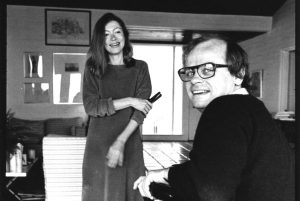[3-minute read]
Here’s a foolish thing, a very 20th-century sort of stinkin’ thinkin’. But worry not, it ends with two great women (and one fine husband, not me) sending out a peculiar but quotable encouragement, and some of us might listen.
I love writing, or having written, or at least the romance of writing. The Canadian Broadcasting Corporation, the dearly beloved Mother Corp of all Canucks leftish, artsy and true, has a long-running radio program called “Writers and Company”. It’s an hour-long conversation between the quietly enthusiastic, impeccably prepared Eleanor Wachtel and a superb range of authors: novelists, playwrights, essayists, poets, from Zadie Smith to George Saunders to Arundhati Roy. These are three of my recent listens, but I wouldn’t likely have heard them if I’d stayed in one particular mental rut.
For me, Writers ‘n’ Co was, for the longest and silliest time, mostly an occasional, accidental listen, often when I happened to be in the car and remembered what time it was: specifically, the Sunday 3 pm slot on CBC’s Radio 1, where Wachtel has been asking her terse but evocative questions since 1990. I’d catch part of a conversation, sometimes the whole thing if there was a writer known to me, and I’d regularly and fervently resolve to never miss another; I found each episode thrilling as a teacher of readin’ ‘n’ writin’, and began to connect it to my own spastic undertakings as a scribbler. (A gutsier, more daring me might have blustered, Wachtel’s gonna interview ME one day. Well. Maybe not. I finally did meet her, briefly, a year or so ago. She was plainer and funnier than she had always sounded to me, that sombre but voluptuous voice teaching me from tinny speakers.)
But I was never much of a planner, and the number of interviews I caught was small compared to the torrent of writer-talk that was available.

